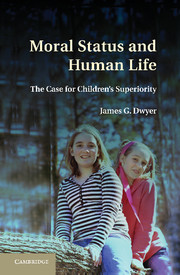Book contents
- Frontmatter
- Contents
- Introduction
- 1 What Is Moral Status and Why Does It Matter?
- 2 How Is Moral Status Determined?
- 3 Selecting Criteria of Moral Status
- 4 Problems in Applying a Multicriteria Approach
- 5 Applying a Multicriteria Moral Status Test to Adults and Children
- 6 Legal, Policy, and Moral Implications of Children's Superiority
- Conclusion
- Bibliography
- Index
6 - Legal, Policy, and Moral Implications of Children's Superiority
Published online by Cambridge University Press: 10 November 2010
- Frontmatter
- Contents
- Introduction
- 1 What Is Moral Status and Why Does It Matter?
- 2 How Is Moral Status Determined?
- 3 Selecting Criteria of Moral Status
- 4 Problems in Applying a Multicriteria Approach
- 5 Applying a Multicriteria Moral Status Test to Adults and Children
- 6 Legal, Policy, and Moral Implications of Children's Superiority
- Conclusion
- Bibliography
- Index
Summary
How would it matter to social existence and the law if children were, in fact, of superior moral standing? Even if one is not persuaded by the case presented in the previous chapters for viewing children as such, one might find it illuminating to consider what the practical implications would be. Imagining a world in which children occupied the top of a moral hierarchy might reveal something about assumptions embedded in current practices.
In this final chapter, I first identify some more general or abstract implications and then a number of more specific consequences in various areas of social existence. The more general implications follow conceptually, so are fairly definite. Identifying, with any confidence, specific implications of reversing the hierarchy of children and adults would require quantifying the difference in status between the groups, measuring all the interests each group has at stake in various situations, and then weighting those interests in accordance with the status-difference multiplier. Because I cannot undertake such a complicated calculation even in a rough way in this book, the specific implications I offer are speculative. It is worth noting, though, that adults are generally not very demanding of exactitude in determining when it is appropriate to subordinate others' interests, such as those of animals, children, and fetuses, to their own interests; many simply view their own interests as trumping those of all other creatures except when the interests other beings have at stake are huge and their own are rather trivial (and even in some such situations most decide in favor of their own interests, carnivorous eating being an obvious example).
- Type
- Chapter
- Information
- Moral Status and Human LifeThe Case for Children's Superiority, pp. 188 - 198Publisher: Cambridge University PressPrint publication year: 2010



